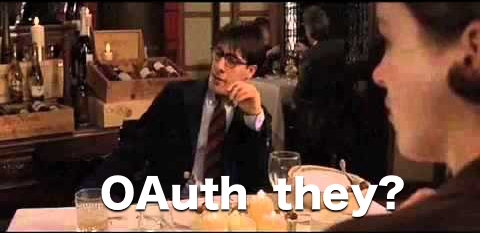OAuthThey

OAuthThey is a single purpose OAuth 1.0a implementation, specifically for use with Discogs.
It features modern Swift conventions and types, like the new concurrency model, and utilizes the latest Apple APIs, like the more modern ASWebAuthenticationSession, for presenting web UI.
Getting Started
OAuthThey uses the Swift Package Manager.
To include it in your project, just add it as a swift package dependency in XCode and import OAuthThey in any files that need to use it.
dependencies: [
.package(url: "[email protected]:nrivard/oauththey.git", .upToNextMajor(from: "1.0.0")),
],
Using OAuthThey
The Client
All of your interactions with OAuth center around Client.
This type is responsible for starting the authorization flow, authenticating requests, and discarding authorization tokens when a user wants to sign out.
Because Client is an actor, all of your interactions with it are async.
To start the authentication flow using OAuth 1.0a, first create your Client.Configuration and provide it to Client(configuration:):
let config = Client.Configuration(
consumerKey: consumerKey,
consumerSecret: consumerSecret,
userAgent: "OAuthTheyTester/1.0",
keychainServiceKey: "OAuthTheyTester"
)
let client = Client(configuration: config)
Requesting Authorization
Next, create your AuthRequest and provide an ASPresentationAnchor to present web UI from.
OAuthThey provides Platform.currentWindow which is a convenience for getting the current window on iOS and macOS.
let authRequest = Client.AuthRequest(
requestURL: URL(string: DiscogsOAuthEndpoints.requestURL)!,
authorizeURL: URL(string: DiscogsOAuthEndpoints.authURL)!,
accessTokenURL: URL(string: DiscogsOAuthEndpoints.accessToken)!,
window: PlatformApplication.currentWindow // if you haven't specified this on the `MainActor`, you may need to `await`
)
Now call startAuthorization with your request on Client.
This call is async and returns a Token (which you can safely discard) so you can call this on any Task.
If authorization is successful, the valid Token will automatically be persisted to the Keychain using the given keychainServiceKey provided in the Configuration.
Task {
do {
// you will never need to directly hold onto or interact with the returned `Token` but it's provided
// in case you want to display the key or secret for some specialized reason
let _ = try await client.startAuthorization(with: authRequest)
} catch {
print(error)
}
}
Restoring Authorization
When creating a Client, if a valid Token is found in the Keychain, it will automatically start in an authenticated state.
You can query this state to avoid going through the authorization flow again:
if await client.isAuthenticated {
// already a valid client
} else {
// start auth flow
}
Signing Requests
Now that you're authenticated, you simply need to sign each request:
let request = URLRequest(url: Discogs.searchEndpoint)
await client.authorizeRequest(&request)
OAuthThey will automatically include the proper OAuth headers on your request as well as User-Agent.
You are responsible for Content-Type, Accepts, and any other headers your service may require.
Logging Out
Cleaning up when a user wants to log out is easy as well, including removing the persisted Token from the Keychain:
await client.logout()
Test Application
Included is a barebones test application, OAuthTheyTester, that you can use as a springboard for your own OAuth authentication.
You will need to fill out your own Discogs consumerKey and consumerSecret in ContentView if you want to test it.
Notes
OAuthThey currently only supports PLAINTEXT signature methods and does not support expired tokens or other advanced OAuth features.
This is a very barebones approach to OAuth for use with Discogs.
GitHub
| link |
| Stars: 1 |
| Last commit: 1 year ago |
Swiftpack is being maintained by Petr Pavlik | @ptrpavlik | @swiftpackco | API | Analytics